Dr. Marek Kapička “What are the benefits of wealth taxes?”
April 3, 2025
In this lecture, Dr. Kapicka reviewed classical economic theories and argued that they often overlook the role of asset price responses to tax changes. He demonstrated that the equilibrium response of asset prices substantially reduces the effectiveness of progressive asset taxes in decreasing consumption and wealth inequality. This is primarily because such taxes tend to increase the equity premium and the risk-free rate, thereby mitigating their direct redistributive effects. The session also delved into the welfare implications of wealth taxation.
About the Speaker: Dr. Marek Kapicka is a Senior Researcher at CERGE-EI in Prague. His research focuses on macroeconomics, public finance, and economic inequality. Dr. Kapicka earned his Ph.D. in Economics from the University of Chicago and has held academic positions in both Europe and the United States.
Dr. Nurzhanat Ametbek “The Role of the Middle Corridor in Eurasian Connectivity”
December 13, 2024
This public lecture examined the rising strategic importance of the Middle Corridor amid disruptions to northern and southern trade routes. Stretching from China through Central Asia, the Caucasus, and Turkiye to Europe, the corridor—revived under China’s Belt and Road Initiative—positions Kazakhstan as a key transit hub. Despite challenges like weak infrastructure and customs delays, growing interest from global powers such as the EU and the U.S. underscores the corridor’s potential to become a vital link between East and West, provided regional cooperation and investment persist.
About the Speaker: Dr. Nurzhanat Ametbek is an Assistant Professor at the International School of Economics at Maqsut Narikbayev University. Her research explores China’s growing influence in Central Asia, with a particular focus on its relations with Kazakhstan.
Dr. Nygmetzhan Kuzenbayev “Perceived Terrorism Threat and Emigration Intentions”
November 13, 2024
In this lecture, Dr. Nygmetzhan Kuzenbayev examined how perceived terrorism threats influence emigration intentions in Kazakhstan. The findings indicate a significant positive association between terrorism threat perception and emigration intentions, even after accounting for various demographic and socio-economic factors. The analysis also highlighted that young people, ethnic minorities, and those dissatisfied with Kazakhstan’s political and economic conditions are more likely to consider emigration. The study contributes to a broader understanding of how perceived insecurity operates as a migration push factor in the Central Asian context.
About the Speaker: Dr. Nygmetzhan Kuzenbayev is an Assistant Professor at the International School of Economics, Maqsut Narikbayev University, where he also serves as Director of the Center for Economic Research. His research interests lie at the intersection of economics, psychology, and political science.
Dr. Riccardo Pelizzo “The Problem of Tradition”
November 2, 2024
This lecture explored the complex dynamics between tradition and modernity, examining how traditional beliefs—such as superstition and ritual practices—impact political outcomes. Drawing on his latest research, Dr. Pelizzo discussed the ways these beliefs often intersect with support for strongman leadership and influence voting behavior. His insights span diverse global contexts, highlighting how traditional beliefs persist and interact with modern political systems in both developing and developed nations.
About the speaker: Dr. Pelizzo is currently a Professor and Vice-Dean for Academic Affairs at the NU Graduate School of Public Policy. He ranks in the top 1% of scholars in Kazakhstan (across all fields) based on the i-10 index over the past six years. He has made significant contributions to the understanding of the political consequences of traditional beliefs.
Dr. Jessica Neafie “Chinese Silk Road slogans and perceptions of Chinese FDI in Kazakhstan”
September 27, 2024
As China attempts to fulfill the cooperation priorities of the Belt and Road Initiative (BRI), criticism has chiefly focused on the development of people-to-people connectivity. Through Silk Road strategic narratives, China seeks to counter public perceptions that do not always recognize the benefits of Chinese investment. In this lecture, Dr. Jessica Neafie explored whether China had been able to operationalize geopolitical imaginaries to influence local perceptions. She also investigated whether citizens’ historical beliefs tied to identity shaped their views of the BRI and China’s economic, political, and technological influence.
About the speaker: Dr. Jessica Neafie is an Assistant Professor at the Department of Political Science and International Relations at Nazarbayev University. Dr. Neafie’s research focuses on various issues, including the impact of Foreign Direct Investment (FDI) on the environment, the interactions between society and Multinational Corporations (MNCs), and the impacts of the Chinese Belt and Road initiative in Developing Countries.
Topic: Digital Citizen Activism in Central Asia: beyond contestation and cooperation
Abstract: The recent rise of digital activism in the Arab Spring revolution and Euromaidan demonstrated the significance of social media and new technologies in mobilizing civil society activists in authoritarian regimes. Digital citizen activism has also been on the rise in post-Soviet Central Asia, with the evidence that the October events in Kyrgyzstan in 2020 and the January riots in Kazakhstan in 2022 were fueled by the heightened tension and mobilization of citizens in social media. This chapter proposes to investigate how digital activism evolves and engages with the authoritarian states in autocratic post-soviet Central Asia. This work aims to answer the following questions by uncovering the activities of the digital activism communities through in-depth interviews with activists in Kazakhstan, Uzbekistan, and Tajikistan.
About the author: Bakhytzhan Kurmanov is an Assistant Professor, International School of Economics, Maqsut Narikbayev University, Astana, Kazakhstan. Bakhytzhan’s research interests include open government, citizen activism, authoritarian politics, public sector reforms, and the political economy of the post-soviet countries. He holds PhD in Public Policy at Nazarbayev University in 2021, investigating Open Government reform in Central Asia. Bakhytzhan received his Master’s degree in public administration from the Australian National University in Canberra and his BA in public policy and management from York University in Toronto. He previously worked on various assignments in the United Nations Development Programme, the Asian Development Bank, the Economic Research Institute at the Ministry of National Economy, and other Kazakhstani think tanks
Within our Dean’s Lecture Series Dr. Kamshat Sаginbekova presented her PhD thesis study.
Topic: Politico-Economic Aspects of Strategic Trade Control in Central Asian Countries
Abstract: Interdisciplinary research aims to consider the economic effects of a political tool such as strategic trade control after its adoption and implementation in various Central Asian countries, namely Kazakhstan, Kyrgyzstan, Tajikistan, Turkmenistan, and Uzbekistan. The study seeks to understand the political and historical backgrounds of implemented control systems and grasp the current status based on the descriptive analysis of strategic trade control elements by applying the 3WH method (“Why? Who? What? How?”). The study then analyses the economic effects of adopting and implementing control systems by applying two approaches to examine the implications of dual-use technology transfer. First, to explore the impact of strategic trade control on trade flows (exports and imports) of dual-use items. Second, to analyse the impact of imports of dual-use technology on total factor productivity.
About the author: Kamshat Saginbekova, PhD in Political and Social Sciences, Teaching Professor at International School of Economics, Maqsut Narikbayev University. Kamshat has defended her PhD thesis on Strategic Trade Control in Central Asian Countries by analysing the export control systems in five countries and studying the economic aspects of the taken political decision. Kamshat has an economics background and experience in academia, research institutes, and the corporate sector.
Associate Professor of the ISE Dr. Azat Aituar presented his study within our Dean’s Lecture Series.
Topic: Analysis of Effectiveness of Economic Diversification of the Republic of Kazakhstan
About the author: Dr. Azat Aituar – PhD, Associate Professor of International School of Economics of Maqsut Narikbayev University. Azat has enormous experience gained working at different positions of national and international companies. He got his PhD in Economics from the University of Reading (UK) in 2016, Bolashak scholar. His field of study is Economic growth and International trade.
Dr. Alisher Aldashev presented his study of “Festivity spending, rat race, and underdevelopment: Theory and evidence from Central Asia.”
Utilizing a comprehensive household survey from Kyrgyzstan, the study reveals a significant portion of income being channeled towards festivities, often sidelining essential needs such as food and education.
While these festive expenditures boost social stature and extend social connections, they negatively impact health and educational outcomes, further entrenching poverty cycles. We develop a model emphasizing the competitive nature of such spending, suggesting that mere financial market reforms might not alleviate poverty.
Alisher Aldashev is a Professor of Economics at KBTU and is widely recognized as one of the most cited economists in Kazakhstan, as evidenced by his impressive Scopus H-Index. His academic focus lies within the realms of development and labor economics. Dr. Aldashev earned his doctoral degree in Economics from the esteemed University of Regensburg in Germany. He boasts a rich professional background, having contributed his expertise to various institutions including the University of Regensburg, the Center of European Economic Research (ZEW) in Mannheim, and Satbayev University. His scholarly pursuits encompass the fields of language economics, values, informal institutions, and the dynamics of immigrant labor. His extensive experience includes active involvement in research projects, some of which were commissioned by such prestigious entities as the Federal Ministry of Labor and Social Security in Germany, the German Science Foundation, Volkswagen Foundation, and Kazakhtelecom JSC. In these projects, Dr. Aldashev assumed the role of chief economist, applying his expert skills in econometric modeling. Currently, Professor Aldashev serves as a Co-Principal Investigator in a Nazarbayev University Grant Project titled “The Influence of Tradition, Culture, and Historical Factors on Economic Outcomes in Central Asia and Russia.”
Dean’s Lecture Series in 2022
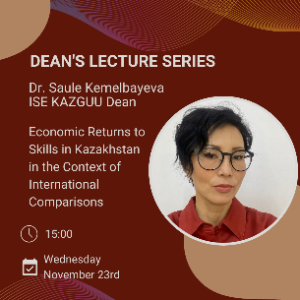
Economic Returns to Skills in Kazakhstan in the Context of International Comparisons by Saule Kemelbayeva, Dean of the ISE.
The study examines the economic returns to literacy, numeracy and problem-solving skills in adults in Kazakhstan with the OECD data. Unlike in other countries, the returns to skills are neither economically nor statistically significant. This finding, however, is fully driven by the public sector of the economy, while in the private sector the skills significantly improve one’s earnings. The returns to formal education accounting for skills are comparable in public and private sectors. This likely causes the outflow of most productive workers to the private sector and question the efficiency of the public sector of the economy in Kazakhstan.
Educated into Sinophilia? How Kazakh Graduates/Students of Chinese Universities Perceive China by Zhanibek Arynov, Assistant Professor at the Graduate School of Public Policy, Nazarbayev University
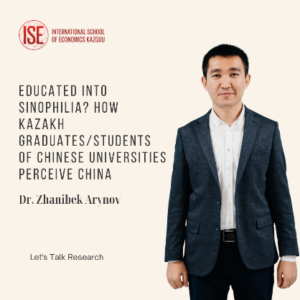
This article examines perceptions of China and contributes to the ongoing academic debate on Sinophobia in Central Asia. However, unlike existing studies, it specifically focuses on perceptions of those, who have first-hand China experience – Kazakh students/graduates of Chinese universities. Based on in-depth interviews with them, the article argues that those with first-hand China experience tend to reject the China threat theory, found to be widespread among the general population. Instead, China educated Kazakh youth perceive China mostly as an economic opportunity for their own country. Yet, this does not necessarily make them Sinophiles in the sense that they still express certain concerns related to their country’s potential over-dependence on China. But more interestingly, they see China as the “civilizational other.” This perceived civilisational abyss even among the more-informed segments of the population appears to be one of the main causes of the alienation of China and the Chinese in Kazakhstan.
Applying Quantitative Methods in Business Research
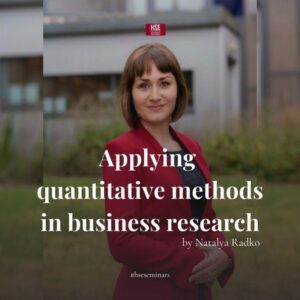
ISE welcomes Master’s students and researchers to the webinar series.
If you are a positivist and are in love with numbers, logic, and an objective stance, please join our next webinar “Applying quantitative methods in business research” by Natalya Radko. Natalya is a PhD researcher at Henley Business School. Her research focuses on analysing and evaluating entrepreneurial outcomes of universities and companies. In addition to being a teaching assistant at Henley Business School, as part of her PD scholarship, Natalya is a manager within the Creative Spark: Higher Education Enterprise Programme. This is a five-year British Council initiative to support partnerships to develop enterprise skills and creative economy across seven countries in Central Asia and South Caucasus.
Business owners are often forced to make decisions under conditions of uncertainty. Luckily, quantitative techniques enable them to make the best estimates and thus minimize the risks associated with a particular decision.
⠀
Webinar will introduce students to Regression as one of the techniques for quantitative data analysis in order to understand the behaviour and performance of a business. We will go through different type of regression analysis based on data types.
A Day In The Life of A Data Scientist

ISE welcomes students and researchers to our webinar series. The next webinar ” ” is conducted by Eduardo Gonzalo Almorox, Data Scientist, The Olympic Channel Services, Madrid, Spain.
⠀
Data scientist and economist with more than 12 years of international and multicultural experience in research and data analytics. Specialized in the design of tools that enable the collection of social data and the application of (quasi) experimental techniques to evaluate different types of strategies.
Eduardo uses machine learning and statistical models to provide interpretable business insights from complex data and communicate craft solutions to technical and non-technical audiences.
Quasi-experimental methods: how to address causal questions with observational micro-data?

“In an ideal world, the best thing to establish causality between two phenomena is to run an experiment. The reality (especially, in social studies) is often too complex for experiments. However, observational data sometimes could be treated as experimental data. In this session, I will briefly go through the basics of the main quasi-experimental methods such as matching, instrumental variables, regression discontinuity design, difference-in-differences, and panel data methods, explain them intuitively, and provide you with references for further self-studies.
The seminar is for a wide audience interested in quantitative methods, understanding basic OLS regression is preferable.” – Saule Kemelbayeva, Dean of ISE.
Introduction To Case Method
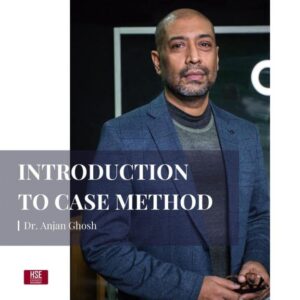
ISE welcomes Master’s students and researchers to the research webinars series.
Our next speaker is Dr. Anjan Ghosh, Associate Professor of Strategy and Entrepreneurship, and Director of Silk Road Case Center, Narxoz University.
Case Method consists of case study research, authoring case studies and case method of teaching. Undertaking case study projects helps students to develop and apply decision-making skills through structured scientific approach. Converting such projects to scientific case studies strengthens a student’s CV. Such studies, when published, establishes a student as both an analyst and research scholar opening opportunities in the job market as well as in higher studies.
For faculty members, case method teaching helps them to make learning more participatory and engaging. Case method research may help them to undertake reflexive research and strengthen both teaching and publishing.
In “Introduction to Case Method” – Anjan helps the audience to explore the world of Case Teaching, Case Research and Case Authoring.
A Social Perspective on Exchange in a Sharing Economy: Structural Equation Modeling
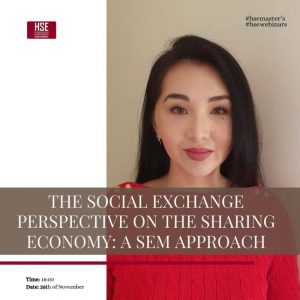
ISE MNU is pleased to invite researchers and postgraduate students to a webinar by Dinara Davlembayeva, Associate Research Fellow at Newcastle University Business School: “A Social Perspective on Exchange in a Sharing Economy: Structural Equation Modeling”. Dinara has over seven years of professional and academic experience in marketing and research. Dinara’s research interests mainly include the application of innovative technologies in people’s lives, consumer behavior in online communities and the impact of online systems on social organizations.
With consumers’ growing reliance on the sharing economy (represented by Airbnb, Couchsurfing, Time Banking, etc.), there is still little evidence in the literature about the factors driving exchange in this sector of the “economy.” Given the gaps in the literature, at the webinar, Dinara will present the results of research work aimed at studying psychological and social motives, as well as the impact of the sharing economy on social integration and subjective perception of the quality of life.
An Introduction to Geospatial Analysis Using R
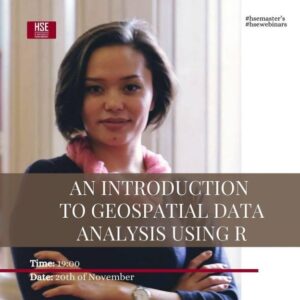
Daliya Kaskyrbaeyva is currently working on her research at the University of Leeds. Her research focus is on assessing the impact of provider payment reforms on hospital productivity in Kazakhstan. She has also collaborated on a range of health economics research projects such as health costing model and voluntary health insurance; and provided methodological support to the Ministry of Health and local authorities in Kazakhstan.
This seminar is designed to provide an introduction to handling, analysing and visualising geospatial data using various R packages.
⠀
Learning activities:
· Introduction to geospatial data
· Preparing data for mapping: download, upload and merge data (15’)
· Mapping using Kazakhstan map: bubble maps, choropleth maps (15’)
· Bonus: interactive maps
How to supervise Master’s dissertations
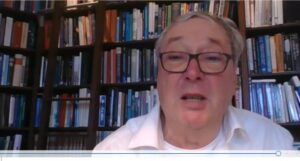
We would like to thank Professor Richard T. Griffiths, Leiden University, for the webinar: “How to supervise Master’s dissertations”. He shared his experience and expertise in managing the research process of postgraduate students.
At Leiden Richard set up the MA in European Union Studies and the BA in International Studies. His expertise lies in the field of European integration and in the critical analysis of the data employed in social science and economics analyses. He is one of the few academics who remembers when writing was done with a pen and a set of index cards. He enjoys syllabus design and experimenting with new innovatory teaching methods. Prof. Richard Griffiths graduated in economic history and Russian studies at Swansea University College and holds a PhD in History from Cambridge University.
It was an interesting and stimulating discussion for our colleagues from ISE MNU and other Kazakhstani universities.
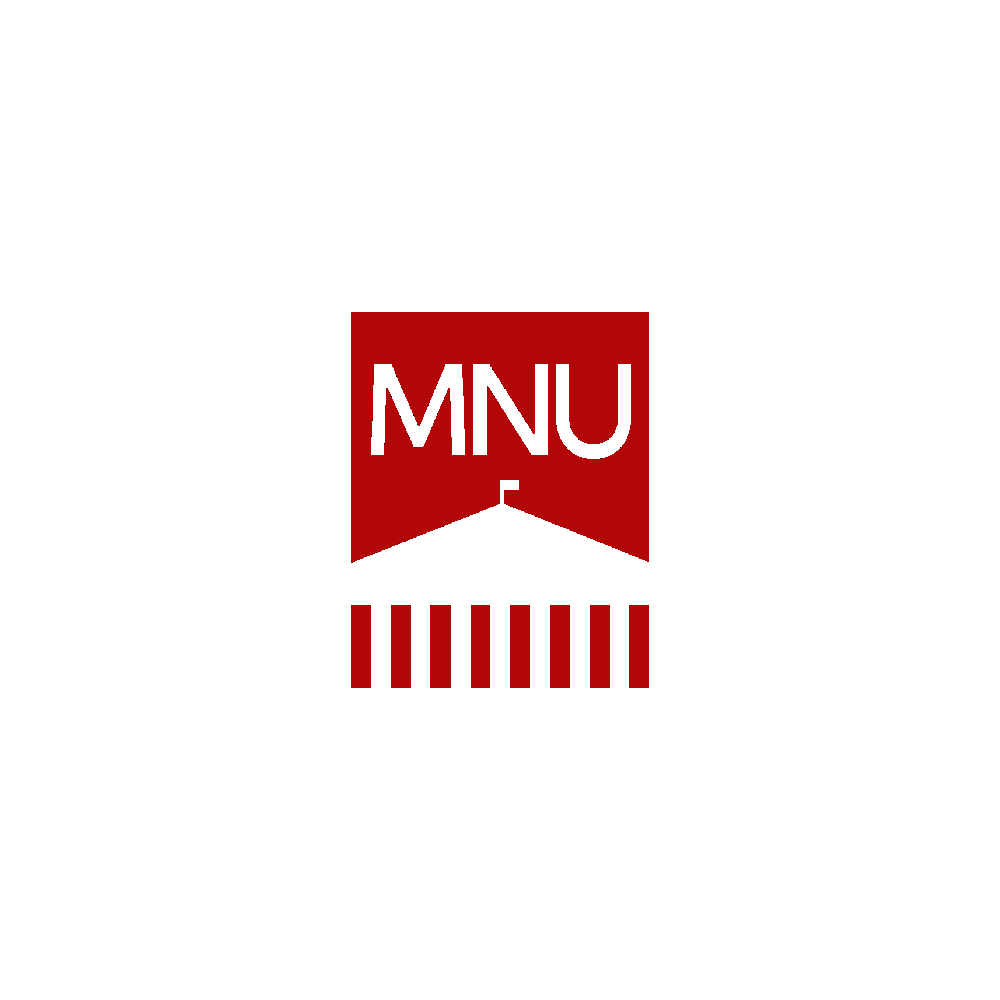



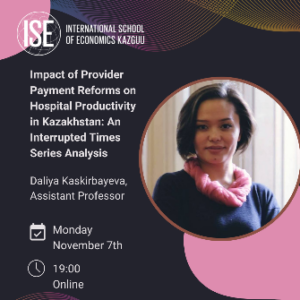
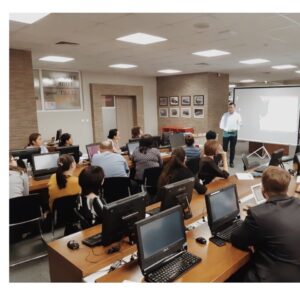 Let’s Talk Research seminars, organized by International School of Economics of MNU, intend to provide an overview of skills, best practices and life hacks to start and finish international publication projects.
Let’s Talk Research seminars, organized by International School of Economics of MNU, intend to provide an overview of skills, best practices and life hacks to start and finish international publication projects.